
203
Chapter 15: Going on Location: Placing Descriptions Correctly
UThe sentence begins with a verb form (To form the “Greeting Turtle Posture”), so the subject of
the sentence must be the person who is supposed to do this ridiculous exercise. In the cor-
rected sentence, an understood “you” fills that need.
VThe laundry description belongs to mat, not to armpits, though I do think fluffy armpits are nice.
WIn the original sentence the subject of bending is implied, not stated, so by default, the other
subject in the sentence (the left ankle) takes that role. But the left ankle can’t bend the right
knee, so the logic is flawed. Changing the second half of the sentence to “relax the left ankle”
makes the subject you (understood), and “you” works as the understood subject you want for
the first half of the sentence. Another possible solution: Change the first half of the sentence to
“While you are bending. . . .”
XThe description almost applies to minute, not to bending.
YIn the original sentence now is equidistant from throw and extending, creating a vague state-
ment. Moving the description clarifies the meaning. Once you move now, add a comma between
back and extending to help the reader separate these two actions.
zThe description only applies to the number of times one should breathe, not to the number of
actions one should be doing.
ZThe introductory verb form must be an action done by the subject, and the nose can’t tuck the
chin. The understood subject you can tuck the chin.
1The color description belongs to sky, not to yoga posture. Another, more concise correction is
to delete “that is blue” and simply say, “blue sky.”
22_599321 ch15.qxp 4/3/06 11:31 PM Page 203

204 Part IV: All You Need to Know about Descriptions and Comparisons
22_599321 ch15.qxp 4/3/06 11:31 PM Page 204

Chapter 16
For Better or Worse:
Forming Comparisons
In This Chapter
䊳Creating the comparative and superlative forms of adjectives and adverbs
䊳Dealing with irregular comparisons
䊳Identifying absolutes that may not be compared
Does Nellie have a bigger ice cream cone? Whose cold is worse? Do you think Tom
Cruise is the most attractive, strongest, and richest star in Hollywood? If human beings
weren’t so tempted to compare their situations with others’, then life — and grammar —
would be a lot easier.
Comparisons may be expressed by one word (higher, farther, or sooner) or two words (more
beautiful, most annoying, or least sensible). Sometimes many words are needed (taller than
any other Lincoln impersonator or as much electricity as Con Edison). I deal with extended
comparisons in Chapter 17. In this chapter you get to practice creating and placing one- or
two-word comparisons that make your meaning come through loud and clear (Oops! What I
meant was more loudly and more clearly).
Visiting the -ER (And the -EST):
Creating Comparisons
Adjectives (words that describe people, places, things, or ideas) and adverbs (describing
actions, states of being, or other descriptions) are the basis of comparisons. Regular
unadorned adjectives and adverbs are the base upon which two types of comparisons may
be made: the comparative and the superlative. Comparatives (dumber, smarter, neater, more
interesting, less available, and the like) deal with only two elements. Superlatives (dumbest,
smartest, neatest, most interesting, least available, and so forth) identify the extreme in a
group of three or more. To create comparisons, follow these guidelines:
⻬Tack -er onto the end of a one-syllable descriptive word to create a comparative form
showing a greater or more intense quality. For descriptions of more than one syllable,
the -er may sound awkward. Generally, comparatives of long words are created by tack-
ing more onto the description. For a comparative that shows inferiority, use less.
⻬Glue -est to one-syllable words to make a superlative that expresses superiority.Most
does the trick for most longer words. Superlatives expressing inferiority are created
with the word least.
23_599321 ch16.qxp 4/3/06 11:30 PM Page 205

⻬Check the dictionary if you’re not sure of the correct form. The entry for the
plain adjective or adverb normally includes the comparative and superlative
forms, if they’re single words. If you don’t see a listing for another form of the
word, take the less/more, least/most option.
As you may have guessed, a few comparatives and superlatives are irregular. I discuss
these in the next section, “Going from Bad to Worse (and Good to Better): Irregular
Comparisons.”
Ready for some comparison shopping? Insert the comparative or superlative form, as
needed, into the blanks for each question. The base word is in parentheses at the end of
the sentence.
Q. Helen is the _______________ of all the women living in Troy, New York. (beautiful)
A. most beautiful or least beautiful. The sentence compares Helen to other women in Troy,
New York. Comparing more than two elements requires the superlative form. Because
beautiful is a long word, most and least create the comparison. Which should you choose?
The answer depends on your opinion of Helen’s looks. Personally, ever since the do-it-
yourself face-lift, I’m going with least.
1. Helen, who manages the billing for an auto parts company, is hoping for a transfer to the
Paris office, where the salaries are _______________ than in New York but the night life is
_______________. (low, lively)
2. Helen’s boss claims that she is the _______________ of all his employees. (efficient)
3. His secretary, however, has measured everyone’s output of P-345 forms and concluded
that Helen is _______________ than Natalie, Helen’s assistant. (slow)
4. Natalie prefers to type her P-345s because she thinks the result is _______________ than
handwritten work. (neat)
5. Helen notes that everyone else in the office writes _______________ than Natalie, whose
penmanship has been compared to random scratches from a blind chicken. (legibly)
6. Helen has been angry with Natalie ever since her assistant declared that Helen’s coffee
was _______________ than the tea that Natalie brought to the office. (drinkable)
7. Helen countered with the claim that Natalie brewed tea _______________ than the office
rules allow, a practice that makes her _______________ than Helen. (frequently, productive)
8. The other auto-parts workers are trying to stay out of the feud; they know that both
women are capable of making the work day _______________ and _______________ than it
is now. (long, boring)
9. The _______________ moment in the argument came when Natalie claimed that Helen’s
toy duck “squawked _______________ than Helen herself.” (petty, annoyingly)
10. I bought the duck for Helen myself, and it was the _______________ toy in the entire store!
(expensive)
11. Knowing about Helen’s transfer request, I asked for a duck that sounded _______________
than the average American rubber duck. (international)
206 Part IV: All You Need to Know about Descriptions and Comparisons
23_599321 ch16.qxp 4/3/06 11:30 PM Page 206

12. The clerk told me my request was the _______________ he had ever encountered. (silly)
13. I replied that I preferred to deal with store clerks who were _______________ than he.
(snobby)
14. Anyway, Helen’s transfer wasn’t approved, and she is in the _______________ mood imag-
inable. (nasty)
15. We all skirt Natalie’s desk _______________ than Helen’s, because Natalie is even
_______________ than Helen about the refusal. (widely, upset)
16. Natalie, who considers herself the _______________ person in the company, wanted a pro-
motion to Helen’s rank. (essential)
17. Larry, however, is sure that he would have gotten the promotion because he is the
_______________ of all of us in his donations to the Office Party Fund. (generous)
18. “Natalie bakes a couple of cupcakes,” he commented _______________ than the average
Mack truck, “and the boss thinks she’s executive material.” (forcefully)
19. “I, on the other hand, am the _______________ of the three clerks in my office,” he contin-
ued. (professional)
20. When I left the office, Natalie and Larry were arm wrestling to see who was
_______________. (strong)
Going from Bad to Worse (and Good
to Better): Irregular Comparisons
A couple of basic descriptions form comparisons irregularly. Irregulars don’t add -er or
more/less to create a comparison between two elements. Nor do irregulars tack on -est or
most/least to point out the top or bottom of a group of more than two, also known as the
superlative form of comparisons. (See the preceding section, “Visiting the -ER (And the
-EST),” for more information on comparatives and superlatives.) Instead, irregular compar-
isons follow their own strange path, as you can see in Table 16-1.
Table 16-1 Forms of Irregular Comparisons
Description Comparative Superlative
Good or well Better Best
Bad or ill Worse Worst
Much or many More Most
Take a stab at this section’s practice exercises, but don’t go to the -ER if your aim is
faulty and you put the wrong form of the description (which you find in parentheses
at the end of each sentence) in the blank. Just read the explanation in the answers
section of the chapter and move on.
207
Chapter 16: For Better or Worse: Forming Comparisons
23_599321 ch16.qxp 4/3/06 11:30 PM Page 207






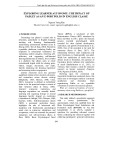
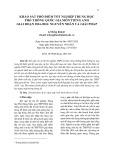
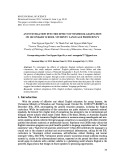
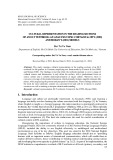
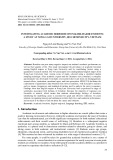

![Tài liệu Từ vựng tiếng Anh Trung cấp [mới nhất]](https://cdn.tailieu.vn/images/document/thumbnail/2025/20250913/nguyentuan250421@gmail.com/135x160/99491757910839.jpg)
![Tài liệu Từ vựng Tiếng Anh theo chủ đề [mới nhất]](https://cdn.tailieu.vn/images/document/thumbnail/2025/20250913/namdhuet@gmail.com/135x160/83251757753810.jpg)


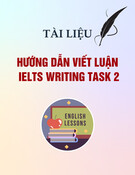
![Tài liệu Từ vựng tiếng Anh cho bé [chuẩn nhất/mới nhất]](https://cdn.tailieu.vn/images/document/thumbnail/2025/20250731/huadaithesang2509@gmail.com/135x160/18631754013896.jpg)








